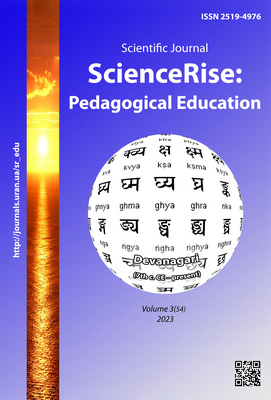Competencies and technologies for improving distance professional education: a modern perspective and approach
DOI:
https://doi.org/10.15587/2519-4984.2023.282682Keywords:
distance professional education, competencies, quality information, interactive methods, effective learningAbstract
Distance professional education is gaining widespread popularity globally due to the rapid advancement of technology and the increasing demand for knowledge and skills. The COVID-19 pandemic has further expedited the shift towards online learning as numerous educational institutions have been compelled to suspend in-person classes. However, not all educators and students were adequately equipped to adapt to this profound change in the learning landscape. Consequently, there is a pressing need to enhance distance professional education by focusing on the development of competencies and the implementation of effective technologies that guarantee the highest level of efficacy and learning outcomes.
This study aims to explore the competencies and technologies that can enhance the effectiveness of distance professional education from a modern perspective. The article presents a comprehensive review of relevant literature, highlighting the challenges and opportunities, associated with distance education in the digital era. It further investigates the competencies, required by both educators and learners to ensure successful distance education outcomes. Moreover, the article delves into the innovative technologies and tools that can be employed to enhance engagement, collaboration, and interactive learning experiences in distance education. Drawing on theoretical frameworks and empirical evidence, the study proposes a modern approach that combines the identified competencies and technologies for improving distance professional education. The findings of this research offer valuable insights to educators and educational institutions seeking to enhance the quality and effectiveness of distance education in the contemporary educational landscape.
In conclusion, this research presents a comprehensive perspective and approach to enhance distance professional education through the cultivation of essential competencies and the integration of innovative technologies. By embracing these advancements, educational institutions can provide learners with high-quality, flexible, and interactive learning experiences, fostering their professional development and career growth in the digital age
References
- Gelles, L. A., Lord, S. M., Hoople, G. D., Chen, D. A., Mejia, J. A. (2020). Compassionate Flexibility and Self-Discipline: Student Adaptation to Emergency Remote Teaching in an Integrated Engineering Energy Course during COVID-19. Education Sciences, 10 (11), 304. doi: https://doi.org/10.3390/educsci10110304
- García-Morales, V. J., Garrido-Moreno, A., Martín-Rojas, R. (2021). The Transformation of Higher Education After the COVID Disruption: Emerging Challenges in an Online Learning Scenario. Frontiers in Psychology, 12. doi: https://doi.org/10.3389/fpsyg.2021.616059
- Lloyd-Jones, B. (2020). Developing Competencies for Emotional, Instrumental, and Informational Student Support During the COVID-19 Pandemic: A Human Relations/Human Resource Development Approach. Advances in Developing Human Resources, 23 (1), 41–54. doi: https://doi.org/10.1177/1523422320973287
- Alvarez, I., Guasch, T., Espasa, A. (2009). University teacher roles and competencies in online learning environments: a theoretical analysis of teaching and learning practices. European Journal of Teacher Education, 32 (3), 321–336. doi: https://doi.org/10.1080/02619760802624104
- Williams, P. E. (2003). Roles and Competencies for Distance Education Programs in Higher Education Institutions. American Journal of Distance Education, 17 (1), 45–57. doi: https://doi.org/10.1207/s15389286ajde1701_4
- Darabi, A. A., Sikorski, E. G., Harvey, R. B. (2006). Validated Competencies for Distance Teaching. Distance Education, 27 (1), 105–122. doi: https://doi.org/10.1080/01587910600654809
- Kashora, T., van der Poll, H. M., van der Poll, J. A. (2014). Evaluating the utility of a knowledge acquisition and construction framework for learning management systems. Proceedings of the e-Skills for Knowledge Production and Innovation Conference 2014. Cape Town, 161–172. Available at: http://proceedings.e-skillsconference.org/2014/e-skills161-172Kashora829.pdf
- Lopes, A. P. (2014). Learning management systems in higher education. Proceedings of EDULEARN14 Conference – IATED Publications. Available at: https://recipp.ipp.pt/handle/10400.22/4851
- Franco, D. C. (2022). Gamification as an engagement, learning and interaction strategy for distance education in Mozambique. Academic Voices, 71–81. doi: https://doi.org/10.1016/b978-0-323-91185-6.00010-0
- Leslie, H. J. (2019). Trifecta of Student Engagement: A framework for an online teaching professional development course for faculty in higher education. Journal of Research in Innovative Teaching & Learning, 13 (2), 149–173. doi: https://doi.org/10.1108/jrit-10-2018-0024
- Ferrer, J., Ringer, A., Saville, K., A Parris, M., Kashi, K. (2020). Students’ motivation and engagement in higher education: the importance of attitude to online learning. Higher Education, 83 (2), 317–338. doi: https://doi.org/10.1007/s10734-020-00657-5
Downloads
Published
How to Cite
Issue
Section
License
Copyright (c) 2023 Koval Koval, Ilya Naumovich, Igor Dyadik

This work is licensed under a Creative Commons Attribution 4.0 International License.
Our journal abides by the Creative Commons CC BY copyright rights and permissions for open access journals.
Authors, who are published in this journal, agree to the following conditions:
1. The authors reserve the right to authorship of the work and pass the first publication right of this work to the journal under the terms of a Creative Commons CC BY, which allows others to freely distribute the published research with the obligatory reference to the authors of the original work and the first publication of the work in this journal.
2. The authors have the right to conclude separate supplement agreements that relate to non-exclusive work distribution in the form in which it has been published by the journal (for example, to upload the work to the online storage of the journal or publish it as part of a monograph), provided that the reference to the first publication of the work in this journal is included.







